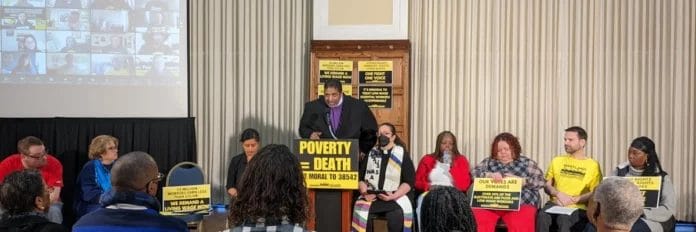The Poor People’s Campaign on Monday launched a 42-week nationwide mobilization of poor and low-income Americans to “wake the sleeping giant” of a voting bloc with the potential to determine the outcome of the 2024 elections.
by Brett Wilkins, CommonDreams.org
“It is time for a resurrection and not an insurrection,” Poor People’s Campaign co-chair Rev. Dr. William Barber II said during a press conference in Washington, D.C. “We must engage poor and low-wealth people to change the political landscape.”
“For far too long extremists have blamed poor people and low-wage people for their plight, while moderates too often have ignored poor people, appealing instead to the so-called middle class,” he continued. “Meanwhile, poor and low-income people have become nearly half of this country and we are here today to make one thing clear: Poor and low-wage brothers and sisters have the power to determine and decide the 2024 elections and elections beyond.”
“Economic justice and saving this democracy are deeply connected.”
“Forty-seven percent of the voters are poor or low-wage,” said one activist. “Getting that vote in is very important.”
Poor People’s Campaign co-chair Rev. Dr. Liz Theoharis stressed that “economic justice and saving this democracy are deeply connected.”
“In this rich nation that has the wherewithal to end poverty tomorrow where there’s the political will, we must not overlook the voices and votes of poor and low-income people,” she added. “We are mobilizing and organizing, registering and educating people for a movement that votes… for healthcare and debt cancellation. Votes for living wages and strong anti-poverty programs. Votes for fair taxes and demilitarization of our communities and our world. Votes for immigrant rights and more.”
LIVE: Poor People’s Campaign Makes Major Announcement About Mobilization Plans for 2024 Election https://t.co/E2Q9NyO9GZ— Poor People's Campaign (@UniteThePoor) February 5, 2024
Democratic pollster Celinda Lake said at the press conference: “In 2024, the election is going to be about mobilization… Democrats have an enthusiasm gap today and the progressive alliance and Democrats have fissures within their constituencies that make getting out the vote even more important.”
“The biggest bloc of potential voters by far is low-income, low-wage voters,” Lake noted. “Where the margin of victory is projected to be less than 3% in 2024, 30-45% of the voters are low-wage voters or low-income families… The turnout among low-wage voters and low-income voters today is… 20-22% below the average turnout. This is a huge bloc of voters, and it is a bloc of voters that votes 58-60%—at minimum—progressive, no matter how conservative the state.”
“You’re talking about a huge number—a game-changing number—of voters,” she added.
The campaign’s main scheduled events are a Mass Poor People’s & Low-Wage Workers’ Moral March to State House Assemblies on March 2 and a rally and march in Washington, D.C. on June 15.
“I have been struggling to pay my bills since I’ve been working at 16 years old. I work full time, 64 hours a week, seven days a week,” said Beth Schafer of Raise Up for $15 during a video promoting the new campaign. “I am exhausted.”
Crow Roberts, an organizer with the Indiana Poor People’s Campaign, said in the video that “our government finds it necessary to ban abortion to say that they are saving our children, but more children die as a result of poverty in this country.”
Guadalupe de la Cruz of the Florida Poor People’s Campaign asserted that “we should not be cornered and forced to choose between one necessity or another.”
Speaking at the press conference, Alabama activist Linda Burns said that “for three years I worked the assembly line at Amazon in Bessemer, Alabama. The work was grueling. We were expected to work like robots, moving like 1,000 pieces per hour.”
“I got badly injured. My left arm,” she continued. “I had two surgeries. I had to get a third surgery, but I didn’t have no more insurance. Amazon, they cut my insurance off a year after. They let me go last October.”
“Amazon let me go because I was helping organize the union,” said Burns. “We didn’t get the union in Alabama but I’m gonna do everything in my power to stand in solidarity. Organizing the union showed me just how many people were in the same situation I was. Not just in Alabama, but all over the world.”
“Forty-seven percent of the voters are poor or low-wage. Getting that vote in is very important,” she added. “We cannot settle for less, we’ve got to stand up for our rights. We are forward together—not one step back.”
Licensed under Creative Commons (CC BY-NC-ND 3.0)





